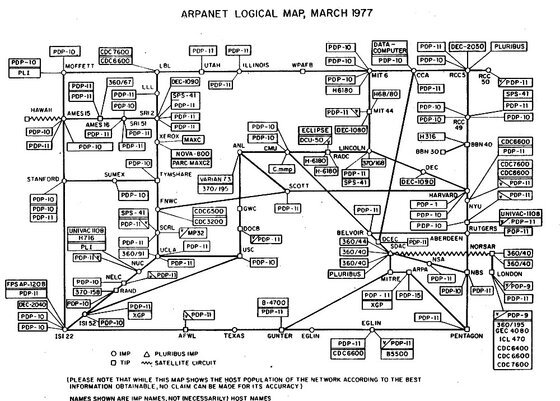
The secret military history of the Internet comes to light in a powerful new book.
It’s well known that the Internet was birthed by the Pentagon. Originally called the ARPANET, the name reflected its origin in the military’s Advanced Research Projects Agency created late in the Eisenhower Administration. What is much less well known is that its principal purpose was not to serve as a communications network that could survive a nuclear attack (although that’s routinely stated as the reason for developing it). In reality, the ARPANET was an offshoot of the US counterinsurgency program in Vietnam in the 1960s. And its central purpose was to facilitate that program and enable domestic surveillance efforts undertaken by the US Army and the CIA during the Vietnam War. These are among the shocking revelations that investigative journalist Yasha Levine brings to light in Surveillance Valley: The Secret Military History of the Internet. As Levine notes, “the Internet was hardwired to be a surveillance tool from the start . . . [It] was developed as a weapon and remains a weapon today.”
Surveillance Valley: The Secret Military History of the Internet by Yasha Levine (2018) 291 pages @@@@@ (5 out of 5)

Over the years, I’ve read a great deal about the history of the Internet, the computer industry, and the agency now called DARPA (for Defense Advanced Research Projects Agency). I consider myself reasonably well-informed for someone who isn’t directly involved in the industry. Yet I often found my eyes widening in surprise as I read Levine’s remarkable story:
- I was disappointed to learn from Levine’s book how deeply involved in military research were virtually all the legendary figures credited with key advances in the evolution of the computer industry and the Internet—and how robust the industry’s links to the Pentagon remain to this day. Douglas Engelbart, for example, the man who created the computer mouse, was working on an ARPA contract. So were Robert Kahn and Vint Cerf, the men who developed the vital TCP/IP protocol that makes the Internet work. Even Stewart Brand, an early evangelist for the computer industry, who made it all seem hip and cool, had lived on the military’s dime in the 1960s. All these men were, in fact, working either for ARPA itself or for the Stanford Research Institute (now SRI), which was heavily funded by the US military.
- “For many Internet companies, including Google and Facebook, surveillance is the business model. It is the base on which their corporate and economic power rests.” These statements should be obvious, since we all know that these firms vacuum up information indiscriminately, but Edward Snowden’s revelations have fastened our attention on the NSA. In fact, the NSA couldn’t operate as it does without the help of Google, Facebook, and their peers.
- I was shocked to discover that the online network Tor was created and funded by the US intelligence community. Tor, part of the dark web, is used by drug traffickers, arms dealers, and purveyors of child pornography to escape detection by law enforcement. Admittedly, some of these criminals have been rounded up as a result, but thousands of others continue to operate with impunity on Tor.
Secret military history: echoes of the Holocaust
In the Epilogue to Surveillance Valley, Levine reports on a trip to the former Nazi death camp at Mauthausen in Austria. He explains that the meticulous record-keeping for which Hitler’s regime was notorious was made possible by using IBM machines. “Nazi Germany employed the same technology to systematically carry out the Holocaust” as the US government and the Internet giants are using today. “Mauthausen is a powerful reminder of how computer technology can’t be separated from the culture in which is it developed and used.” Given the current state of American society, and the country’s leadership in Washington, this point is sobering indeed.
This book has been treated unevenly by reviewers. Publisher’s Weekly panned it. Kirkus Review was somewhat kinder, terming it “a sometimes-overwrought but provocative history of the internet-equipped security state.” The New Yorker was far happier with the effort: Levine’s “tone is often contentious, but, amid increasing dismay about technology’s influence on contemporary life, such forceful questioning is salutary.” To that I say, Amen.
About the author
Yasha Levine is a Russian-American investigative journalist who was born in the Soviet Union. Surveillance Valley is based on “three years of investigative work, interviews, travel across two continents, and countless hours of correlating and researching historical and declassified records.” It shows.
Other books on related subjects
Among the books I’ve read and reviewed that covered much of the same ground but from different perspectives were:
- The Pentagon’s Brain by Annie Jacobsen, reviewed at The mind-boggling story of America’s top-secret military research;
- The Imagineers of War by Sharon Weinberger, reviewed at DARPA: inventors of Agent Orange, the M16, GPS, and the Internet;
- Troublemakers: Silicon Valley’s Coming of Age by Leslie Berlin, reviewed at The people who put Silicon Valley on the map;
- Googled: The End of the World As We Know It, by Ken Auletta, reviewed at Behind the scenes at an extraordinary company;
- Top Secret America: The Rise of the New American Security State by Dana Priest and William M. Arkin, reviewed at The shocking reality behind the secret US war on “terror”; and
- The Snowden Files: The Inside Story of the World’s Most Wanted Man by Luke Harding, reviewed at Edward Snowden in context: the inside story.
This is one of the many good nonfiction books about national security reviewed here. And you’ll find it on 5 best books about Silicon Valley.
You may enjoy browsing through 20 top nonfiction books about history plus 80 other good books.
For more good books on the history of the US, see Top 20 popular books for understanding American history.
And you can always find my most popular reviews, and the most recent ones, plus a guide to this whole site, on the Home Page.



























